What the hell is Death Stranding?
This is all anyone has wanted to know since Hideo Kojima unveiled the project three years ago. In that unveiling, all we knew was that it starred a naked Norman Reedus, that there were babies, dead sea creatures, and weird floating people. Not a lot to go on, but given Kojima's long, weird history with the long, weird Metal Gear franchise, it was enough to get people talking excitedly about all the things it could possibly be.
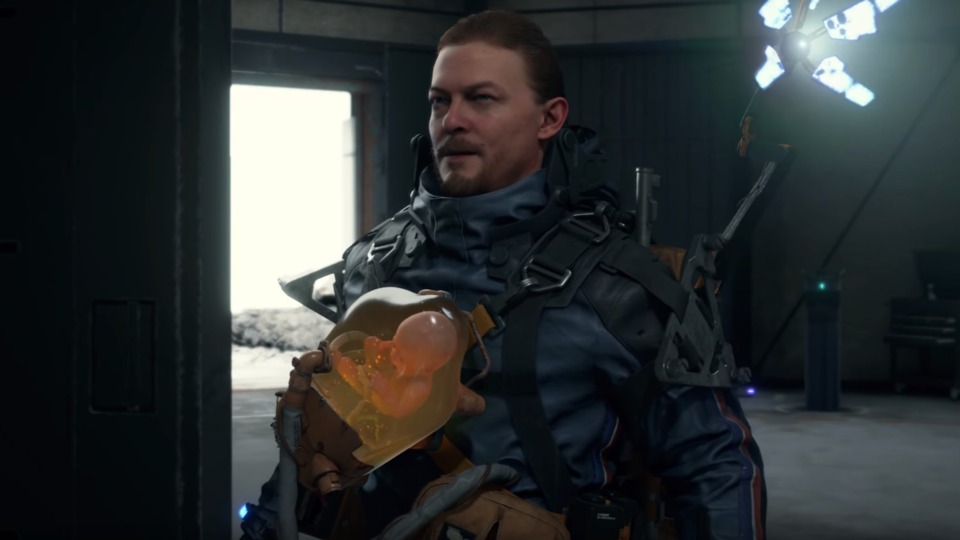
As time has gone on, and even as Kojima has said he himself does not fully understand the game, a clearer picture began to take shape, and now that it is here, we can say definitively what Death Stranding is. It is a third-person action game, with a heavier-than-usual de-emphasis on the "action." It is a game about exploration in which there isn't that much to discover. It is a game about America that takes place in a world that bears only minimal resemblance whatsoever to the country it's portraying. It is a game that takes, at minimum, 10-15 hours to actually become "fun," and even then the definition of fun is one likely to vary wildly for its players. It is a Hideo Kojima game in which the story is the least appealing aspect of the whole endeavor. Ultimately, Death Stranding is a game that is unlike much else I've played before, and I'm not entirely sure if I want to play anything like it ever again.
In Death Stranding, you play Sam Porter Bridges. He is named that because he is a porter, tasked with delivering things to the citizens of a fractured, post-apocalyptic America, and because he is a member of Bridges, an organization dedicated to, well, building bridges--both literal and metaphorical--to those people in order to reconnect the country. Sam is a reluctant hero in the grand Kojima tradition. He's on his own, wandering the country and avoiding human contact because of past trauma, until the last President, Bridget Strand, pleads with him in her dying moments to help bring the "chiral network" back online, and reunite the country.
This network is powered by chiralium, the game's primary McGuffin. It's a magical element that all of the game's technology is based around, and also is related to the game's apocalypse. You see, there was the titular Death Stranding. The barrier between the world of the living and the world of the dead was breached. The dead, represented here as sludgy ghosts attached to umbilical cords, roam chunks of the world and consume human bodies, creating "voidouts," which are basically ghost magic nuclear explosions. Also it rains time now, and if it touches you, it ages you and wrecks your equipment, which is bad.
Anyway, the chiral network. It's the super internet, and in order to reconnect America, you need to hook up the remaining cities and stations to it. Equipped with your trusty BB--a literal baby in a jar (😲) that helps you detect sludge ghosts through its link to its stillmother (😐) and the world of the dead--you do this by delivering packages to all those places. Rhythmically, this game has more in common with something like the Truck Simulator games than your standard third-person action game. As a porter, you schlep boxes of medicine and video games and semen to and from all these different stations throughout the world. Initially, all you've got are your backpack and your feet. The more jobs you take on, the more ludicrous the stack of packages on your back gets, and if you surpass Sam's weight limit, balancing and moving him becomes far more challenging.
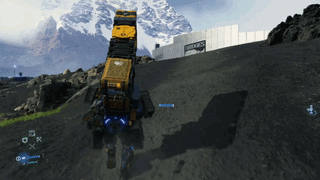
Early on, this is a pain in the ass. You're constantly trying to navigate over rough terrain and through heavy patches of time rain and all you can do is hug the R2/L2 buttons to try to balance yourself. Eventually, you are given a variety of tools to make Sam's journeys more manageable. You start out with basic things like ladders and climbing ropes before graduating to portable, floating cargo trays and full-on trucks. Crafting all these tools takes small amounts of the various resources you'll find littered around the world, but even if you aren't looking to spend a lot of time building and placing things yourself, you may find that other players have been more than happy to do the work for you. Death Stranding includes an asynchronous online system that allows things built in other players' worlds to surface in yours. There are also straight up public works projects multiple players can contribute to, including whole highway builders that greatly mitigate the frustration of trying to navigate the world.
See, without those highways, vehicles aren't very useful. Death Stranding's vision of America looks like a combination of the Norwegian fjords and the surface of Mars. Rocks and cliffs are everywhere, and it's on you to build bridges (of course), highways, and whatever else is necessary to traverse these spaces. And even when you do invest heavily into the game's version of Infrastructure Week, the time rain will degrade any structure in the world, and if you don't add resources to repair them, they'll disappear.
In the opening hours, this doesn't matter as much because you're just on foot and hoofing it from place to place. When you finally get vehicles, using them mostly sucks because you're constantly driving into rocks. When you finally get highways you can build, it starts to feel a little like American Truck Simulator...if you had to craft the truck and the roads yourself. And then the game just kind of gives up on that infrastructure stuff and sends you off to the mountains to criss-cross huge, snow-deluged peaks that take a very long time to get around. And then it asks you to do that a bunch more until the game is essentially over.
I have several issues with Death Stranding, and one of them is pacing. This is a very lumpy game. The opening hours are a slog of endless, precarious walking and a near-constant deluge of new systems being presented to you. Then it just kind of settles into a rhythm of deliveries and discovering new places to deliver to, mostly putting the story on the back-burner until you finish the extremely long third chapter. After that, the A Hideo Kojima Production part of the game suddenly wakes up and you find yourself inundated with more cutscenes and character exposition than you'll ever know what to do with. The early hours have the feel of a child excitedly explaining to you the elaborate fantasy world they just came up with, and then the middle feels like the deep breath they take before launching into all the reasons why things are the way they are in that world. The last hour and change of the game is basically one long run-on sentence that tries to tie up every remaining loose end where you don't really do anything at all except listen to it ramble on.
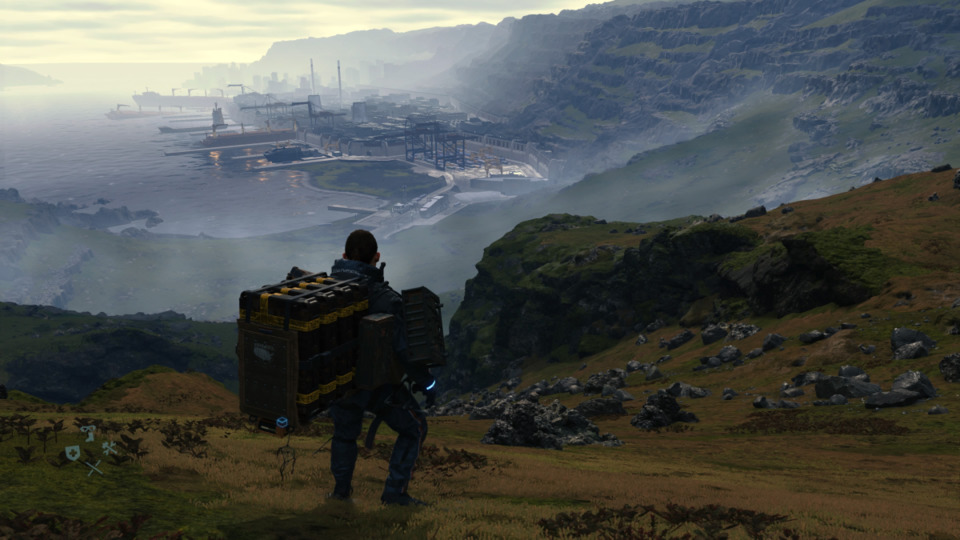
Look, it's not like previous Kojima games haven't had pacing issues, but Death Stranding is the most egregious example of it. It's not nearly confident enough to just rely on the delivery aspect of the game as its main thrust, so it changes things up with combat and stealth sequences that never feel all that great. Early on, combat is something you mostly want to avoid. Human enemies consist of MULES, a group of ex-porters who have been driven insane by the chemical boost they get for receiving "likes" from making deliveries (helloooooooo social media commentary!). They are a nuisance who will come after your cargo, but thankfully you can mostly just beat them senseless with a few quick mashes of the square button. By the time they give you bola guns and stun bombs, they become comically easy to dispatch. BTs, the aforementioned sludge ghosts, need to be avoided until you learn how to make bullets and grenades from your own blood. If you do bump into one, you have to trudge your way through a pool of moaning tar bodies while mashing square to escape. If you fail, you get whisked away to a space some distance away and fight a giant tar animal, for reasons.
To be absolutely clear: these parts of the game are never all that fun. They are not broken or really even difficult; they're merely an oft-tedious distraction. They're the thing you do that's most analogous to Kojima's previous works, but the fights are never very memorable. Whenever a BT section or boss fight cropped up, I often found myself annoyed that my delivery missions were being sidelined, and that is not something I expected to say about a game like this. If I enjoyed anything about playing Death Stranding, it was the moments of solitude I experienced as I wandered from place to place, the moments of quiet beauty as I crested some big hill to see a new city on the horizon. Death Stranding is a game that shines brightest when it's willing to get out of its own way and just let the player exist free of the constraints of its own narrative and need to intersperse its mundanity with middling action.
About that narrative. This being a Kojima game, there is of course a cast of strange characters that exist alongside Sam, helping his mission or standing directly in his way. Each of these characters has some kind of ludicrous backstory that they will eventually explain to you in excruciating detail, even though most of them are literally named after the primary thing that defines their existence in the game. And there are significant sections of the game where everything grinds to a halt so that Kojima (by way of one of these supporting characters) can either explain at length what's going on with any of the myriad bizarre concepts built into the game's narrative, or delve into the latest Wikipedia article he somehow found a way to graft onto the game's plot. None of these inclusions should be surprising, because this is the way Kojima directs his games.
What is surprising is just how flat the vast majority of it all falls. In the Metal Gear series, Kojima's goofy tangents and batshit character monologues felt, to me at least, like amusing digressions set against the series' action cinema bravado. That stuff doesn't come off as well in what is essentially his version of an Andrei Tarkovsky movie. Nothing is allowed to be all that mysterious, and the game constantly tips its hand regarding things that might be considered twists or surprises. Whether it's through monologues, in-game emails and interviews, or someone just flatly stating the premise of what's going on out loud as obviously as possible, very little in Death Stranding is allowed to exist without overwhelming explanation.
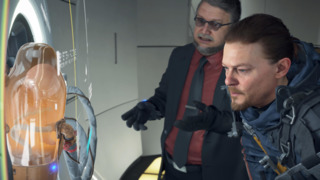
There's also a surprising dearth of memorable characters. Norman Reedus' Sam is especially bland. In a way, he's the perfect video game protagonist, because nearly all he does is grunt and sigh. There's just not much personality to him, which is a bummer given how much time you spend with him throughout the game. The only actor who feels like they're truly on board with the weirdness of the whole thing is Mads Mikkelsen, who plays an otherworldly soldier wraith that pops up just often enough to remind you that Hideo Kojima used to make some games about war. He seems like he's relishing the role, which I can't quite say for most of the other actors involved. Actresses Lea Seydoux and Margaret Qualley do their best with some truly leaden dialogue, and Troy Baker at least tries to chew (or, more accurately, lick) some scenery as the deeply disappointing terrorist villain Higgs, who is named that because he thinks he's like the God particle, and frequently references video games because I guess someone in this game probably had to do that.
Frustratingly, I kept waiting for Death Stranding to offer something to say, something to justify the amount of breath spent explaining its most obvious metaphors and motivations. Unfortunately, it never gets there. Its early game musings on human connectedness and the need to bring people together never evolves over the 50 hours you'll spend playing it. The things it says at the beginning are pretty much the same things it's saying at the end, and none of those things are all that deep.
Even more frustratingly, there were multiple times during the course of my time spent playing Death Stranding that I could see the strands of a game I'd really like. There are individual pieces of the game that I think work well. It's gorgeous, for one thing, offering up a well-realized world with wonderfully unusual looking technology and terrific animation work. And there were times when I found myself genuinely lost in the experience of wandering that world, lugging gear from place to place, building roads and liking ladders and just drinking in the loneliness of it all. Even the massive pile of different systems all feel like they mostly work together in a way that's harmonious.
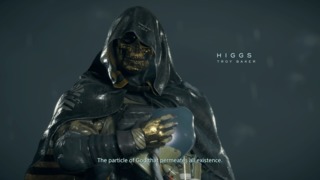
But the whole of the game never achieves that balance. There's a deep thread of insecurity that runs through it, one that manifests in its unwillingness to commit all the way to the arduousness of its main character's task, that's too willing to break that quietness with mediocre action, and that never trusts the player to understand even its most basic ideas without hitting them over the head with them. There is a weirdo, avant spirit to Death Stranding that I do admire, but that spirit fails to carry the game anywhere worthwhile.
At least now we know what the hell Death Stranding is: a disappointment.